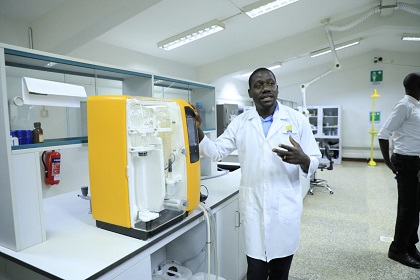
URA has pioneered the application of scientific principles to analyze manufacturing processes, boosting efficiency and tax compliance. By leveraging the Law of Conservation of Matter, URA scientists have developed an innovative input-output analysis tool.
This groundbreaking approach, first introduced by Antoine Lavoisier in 1789 states that matter is neither created nor destroyed but only transformed. Similarly, in manufacturing, inputs equal outputs plus losses. URA’s tool ensures accountability, accuracy and cost optimization.
URA is among the first revenue administrations to work with manufacturers to apply this scientific principle to analyze manufacturing processes. Manufacturers that have worked with URA can attest that the input-output analysis tool has enabled them to get a bird’s eye view of their business, attain better accountability for all their raw materials and how they translate into products, determine expected output with close to accuracy, evaluate cost drivers and minimize costs.
The tool helps improve efficiency of production leading to maximization of profits. To that end, the manufacturer is able to gradually comply as the business flourishes. Furthermore, input-output analysis has been an enabler in formulation and implementation of tax policies that benefit manufacturers.
In a bid to promote the manufacturing sector and exports, the government has put in place various incentives to ensure that local investors benefit immensely from the policy proposals. These include duty drawback (refund) of taxes paid on materials used to manufacture an export product, preferential tax rates for beverages manufactured from local raw materials and many other exemptions.
Through input-output analysis, qualifying entities are ably accorded appropriate tax regimes. URA scientists are confident that once both current and emerging manufacturers are engaged to embrace these scientific approaches, businesses will improve and thence creating a level ground for the rightful beneficiaries to enjoy these privileges.
In a world of ever-evolving economies, we all ought to acknowledge that science is the new frontier for trade facilitation and tax compliance management.






